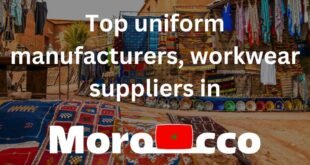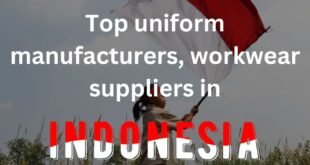Whether you are interested in buying a new dress, a shirt, a jacket or even a wedding dress, you will need to know where to look for the best garment manufacturing companies in Yemen. These companies have been ranked based on a variety of factors, including their reputation, customer reviews and prices.
1 Clothing for men
Using the best data available, the Global Fashion Index (GFI) has compiled a top list of garment manufacturing companies in Yemen, along with their ranking in terms of innovation, performance, and quality. The list includes some of the largest companies in the country, along with the best that money can buy. The list is based on the best information available, including data from the International Monetary Fund, the World Bank, and the Economist magazine.
The GFI’s list of top garment manufacturing companies in Yemen includes several large conglomerates. One of the biggest is Yotex, which specializes in sportswear, men’s clothing, and apparel. The company has an ODM/OEM facility in Fujian, China, as well as a business office in Shanghai. Its most prominent product is men’s sportswear.
The top list of garment manufacturing companies in Yemen also includes some notable exceptions. There are a handful of smaller, but no less successful, companies. The owner of a Tirupur-based apparel maker, for instance, holds marathon haggling sessions with foreign customers. Despite its relative obscurity, the company has a large customer base in South America.
2 Clothing for women
Having been in business since 2003, Stylus Apparel provides custom items for brands and individual customers. The company offers screen printing, dye-sublimation printing and garment embroidery. It also offers woven labeling and cut and sew production.
There are numerous garment manufacturing companies in Yemen. Some of the more notable ones include Yotex, SANS USA, and SUUCHI. Each has their own distinctive set of advantages. For example, SUUCHI is able to produce a shirt in a matter of 16-18 weeks while SANS USA takes a rest after delivering its product. SUUCHI also maintains cost effectiveness and transparency.
SANS USA is one of the few garment manufacturers in the United States. It specializes in men’s sportswear and sells them to the US market. The company also operates an ODM&OEM factory in Fujian, China. It also has a business office in Shanghai.
SUUCHI has the aforementioned low MOQ. The company’s software platform allows them to source and integrate fabrics of all shapes and sizes. They can also produce large amounts of clothes in a short amount of time.
3 Culture
Almost every country in the world counts on garment manufacturing companies to drive the economic growth. In fact, in today’s economy, the garment industry is considered to be the most powerful sector. However, there are serious concerns about the safety of workers in Bangladesh’s RMG industry.
The collapse of the Rana Plaza building in Dhaka in April raised questions about the conditions of the garment industry. The eight-storey complex was built on swampy ground without a permit. The building collapsed like a pack of cards, killing 430 people. This building housed several garment factories. The owner, Mohammed Sohel Rana, is accused of unlawful construction. He is currently in prison.
Despite these serious concerns, the garment industry in Bangladesh remains the most prominent in the world. As of the financial year 2011-12, it ranked second behind China in global ranking of garment exporters. It relies on garments for 80 percent of its exports.
The Bangladeshi government has put a 2,990-strong Industrial Police force in place to prevent unrest in the factory zones. They collect intelligence from the factories and thwart political violence.
4 Kidnappings
Amongst the many reports of forced child labor in the garment manufacturing sector, the latest figures suggest that there are now at least 40,000 children in the country. While these kids are certainly not making a buck, they are working long and hard hours in often unsanitary conditions, for little or no pay.
Sadly, these children are not the only ones in the industry. Indeed, the majority of these kids work in small and medium-sized factories in various cities nationwide, most notably Ho Chi Minh City and Buenos Aires.
Aside from being a source of employment, many children are trafficked from remote parts of the country to the cities where these sweatshops are located. This is a particularly troubling trend since it has a direct impact on the country’s ability to generate employment and improve the living standards of its citizens. In some cases, children are paid a pittance for their menial tasks and are required to complete them at the earliest opportunity.
In some cases, children are provided with inadequate food, while in others they are forced to perform dangerous tasks. Still others are robbed of their identity documents and held hostage by their employers.
5 Export product groups
During the last five years, Yemen’s exports increased by 12.3%. The country’s top 10 export product groups accounted for 96.1% of the total. The industrial sector is centred on crude oil production, petroleum refining, food processing, aluminum products, and small-scale cotton textiles.
The fishing industry in Yemen has received technical assistance from the Soviet Union. The country’s waters are stocked with commercially valuable crustaceans and fish. The industry has been supported by domestic government programs and foreign assistance.
The export of raw cotton has the most opportunity for growth in the country. The country’s industrial production has been boosted by foreign direct investments. However, there are structural impediments to sustainable development. The garment industry will grow in the coming years as eCommerce and social media are gaining momentum.
Yemen is a member of the Arab League and the Organisation of Islamic Cooperation. It shares borders with Saudi Arabia to the north, Oman to the east, and the Gulf of Aden to the south. 85% of the country’s population needs humanitarian aid.
6 Labor costs
Despite the best efforts of the government, child labor remains a persistent plague. The gist is that many children are forced to make the short work of sewing, embellishing, and even dying garments. While this may not sound bad, the conditions in which they work are often grim.
In addition to being subjected to verbal abuse, some workers are also subjected to sexual assaults. In addition, children are routinely denied water and food, as well as access to a bathroom, to name a few. In some cases, children may not even be able to leave the factory at the end of the day, due to long working hours, or they may be required to do so in order to maintain their quotas.
While the garment manufacturing industry is largely a boys club, it is no secret that women are not left out of the running. Girls as young as eleven are reported to be forced to produce garments in Thailand. This is no small feat, as many Syrian refugees are involved in the process. In addition, conditions in informal garment workshops are often unsanitary, with inadequate ventilation, and high temperatures in the summer.
7 Violence against foreigners and Yemenis
During the ancient world, frankincense was the most prized commodity, and Yemen was a major producer. Before Islam, Yemen was home to powerful city-states, as well as a prosperous society based on control over the production of frankincense. The nation also enjoyed exclusive access to luxury commodities from other regions, including eastern African countries. Today, the Houthis remain in control of the capital.
In Yemen, women usually have a secondary role in the household. Men are the main head of the family, and make all the important decisions. They usually wear a traditional janbiyyah, a broad blade, on their abdomen. These are considered symbols of status within the social hierarchy. Often, men carry a firearm, especially in public.
The most significant social event in Yemeni society is the birth of a male child. This ceremony is usually accompanied by a circumcision. Female genital cutting is still observed in Yemen, although it varies from region to region. In rural areas, women work on their families’ farms. Disputes between tribes are frequently resolved through violence.
 Henry Pham (Pham Quang Anh), CEO of DONY Garment
Henry Pham (Pham Quang Anh), CEO of DONY Garment
This year, we have found that many international buyers are seeking new suppliers based in nations outside of China and Thailand to purchase many goods and products, including uniforms, workwear, reusable cloth face mask, and protective clothing.
At DONY Garment, we are proud to welcome international customers, especially those based in the US, Canada, the Middle East, and the EU market to discover the professional production line at our factory in Vietnam.
We guarantee our products are of the highest quality, at an affordable cost, and easy to transport across the world.
 Dony Garment Vietnamese Garment Factory Supplier – Apparel Clothing & Textile Manufactured. Private label clothing Produce women, men, children baby wear – Casual Clothing, Uniform, Workwear
Dony Garment Vietnamese Garment Factory Supplier – Apparel Clothing & Textile Manufactured. Private label clothing Produce women, men, children baby wear – Casual Clothing, Uniform, Workwear








 Henry Pham (Pham Quang Anh), CEO of DONY Garment
Henry Pham (Pham Quang Anh), CEO of DONY Garment



